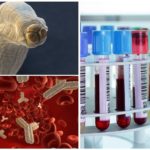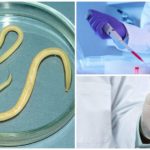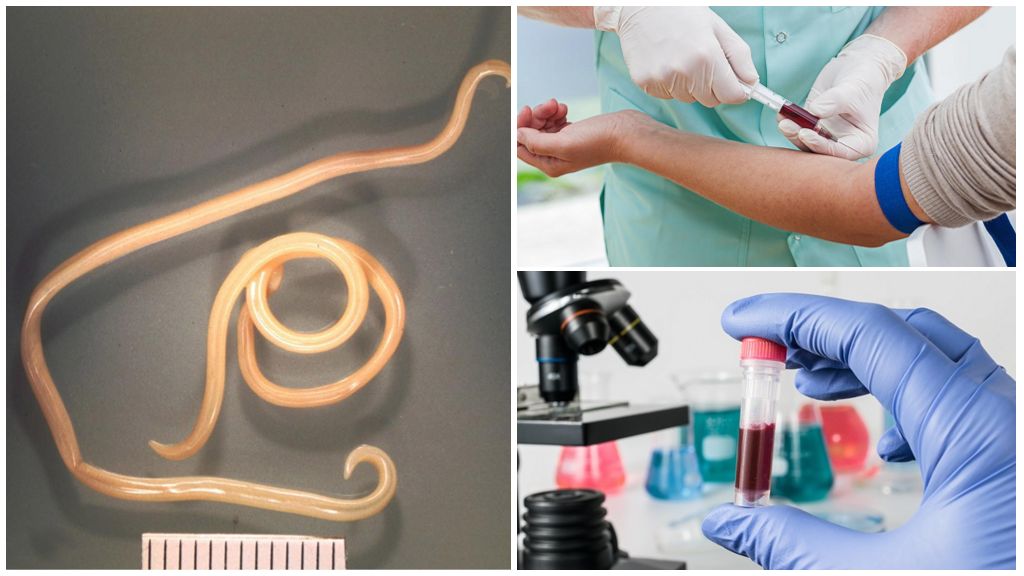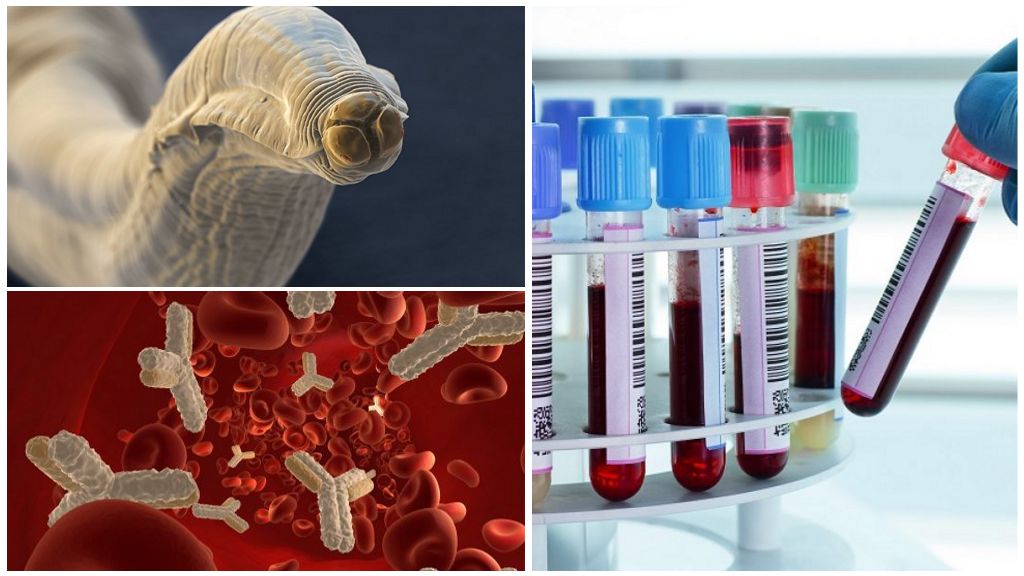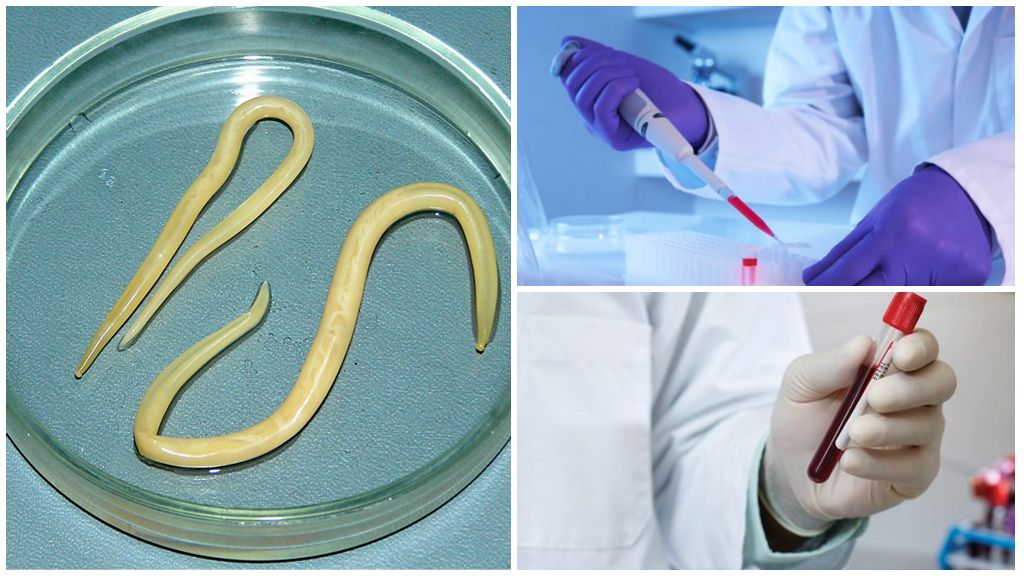Antibodies to toxocars
Content
- Blood test for toxocarosis
- Blood test for toxocarosis
- Blood test for toxocarosis
An analysis of antibodies to toxocars is prescribed for the purpose of testing for toxocarosis. The study carried out by ELISA. This is an enzyme immunoassay that is highly accurate and sensitive. The method allows not only to detect in the blood the protective cells formed during the fight against parasites, but also to determine the duration of infection.ELISA is an affordable procedure and is performed in all modern immunological laboratories.
Briefly about toxocarosis
This disease is caused by worms (worms) of different sex types up to 18 cm in length. Parasites belong to the genus Toxocara canis and live mainly in the stomach and intestinal tract of dogs. A person becomes infected with toxocarosis during games with a pet and upon contact with their fur.
Eggs get from infected hands into the mouth of the host, and in the intestine they turn into adult worms and spread throughout the body through the bloodstream. Migrating from one place to another, the larvae damage biological tissues, suck out nutrients and cause necrosis, allergies and intoxication.
During the active period, the worms affect almost all organs and systems, and the number of total antibodies to toxocars in the blood increases dramatically. Suffer mainly:
- brain;
- liver;
- lungs;
- muscles;
- eyes.
More often sick children are from 1 to 6 years old. The severity of the pathology depends on the localization process. In the cavity, where the larva of toxocar falls, the so-called inflammatory granuloma gradually develops.
With the advent of ELISA (blood test for antibodies) to toxocarosis, the percentage of timely diagnosis of the disease has increased dramatically. But it is not always possible to identify the invasion from the first time.
On a note!
A distinctive feature of the analysis is that a negative result does not always indicate the absence of parasites and may be false. But positive titer is 100% confirmation of infection.
The essence of the study ELISA
ELISA refers to the main serological methods for the diagnosis of parasitic invasions. The essence of the method lies in the detection of class G immunoglobulins, which the body synthesizes in response to toxocar antigens.
Normally, in a healthy person there are no specific antibodies to parasites in the blood. If toksokar enters the body, after a short period of time, the immune system detects alien individuals. This is facilitated by the entry into the blood of specific cells (antigens) of the parasite. They have a protein structure and are contained in the shell, salivary glands and waste products of worms.
In response to antigens, protective cells (lymphocytes) begin to produce antibodies (immunoglobulins), which attack the parasite from all sides and block its movement. But to cope completely with invasion they can do it only if they are infected with the simplest worms. Toksokaroz antibodies of class igg can not win, but their large number is an indicator of infection with the passage of diagnosis.
Antibodies to Toxocara can appear in the blood within 4 days from the moment of infection. Their concentration gradually increases and reaches a maximum after 8–12 weeks. The degree of increase in the content of protective cells is directly related to the severity of the disease. When conducting ELISA, the reaction of antibodies and antigens is studied, in which a specific immune complex (antigen-antibody) is formed.
In evaluating the results, not only the fact of an increase in immunoglobulins, but also their exact number is of particular importance. Comparing a quantitative and qualitative indicator, a laboratory specialist can determine the stage of the disease, as well as distinguish the acute form from the chronic.
Important!
Each laboratory establishes its own ratios and indicators of the pathologies and norms with which the test values are read.This means that it is impossible to compare the results of individual tests for toxocarosis performed in different institutions.
Decryption
During the study, the laboratory technician records the result as a ratio or titer. The final figures help the doctor to establish the severity of the invasion and the duration of infection. The diagnostic titer for toxocarosis in modern laboratories is 1: 100, which corresponds to a negative result and indicates the absence of antibodies to parasites in the body.
On a note!
If the decoding of the analysis indicates a value from 1: 200 to 1: 400, this may indicate a weakly positive test. Typically, such a titer is detected in toxocar carriers in the chronic phase, as well as in patients with ocular and cerebral invasion. This is because the eyes and the brain exist in isolation, in terms of immunology. Low titer in the localization of parasites in these areas significantly complicates the diagnosis.
True positive igg to tokokaram corresponds to a titer of 1: 800 and above. This value is a direct confirmation of the presence of worms in the body. In the period of the acute stage of toxocarosis, when a vivid clinical picture is present, the titer rises sharply. In chronic course the values temporarily decrease.
The level of antibodies is not always a reliable criterion for determining the duration of infection. More accurate data analysis for toxocars can be obtained by determining the positivity index. In the form, it is marked as “idx” with <> signs defining the reference interval.
| The result of the survey on the positivity of the parasite | Decryption |
|---|---|
| Less than 0, 85 | Negative meaning. There is no response to toxocar antigens in the body. |
| More than 0, 85, but less than 1.15 | Doubtful result. Indicates the presence of chronic forms of toxocariasis, as well as the possible localization of the parasites in the eye or head. This value may be after the infection due to long-term preservation of antibodies to toxocars in the blood. |
| More than 1, 15 | Sign of pronounced positivity. Such figures suggest that the patient’s body is not only familiar with the parasite, but also contains a large amount of antibodies to toxocar antigens. |
To clarify the timing of invasion and identify the stage of toxocariasis, the method of determining avidity, that is, the force with which antigens and antibodies interact, is also used. But this method is available only in the context of specialized research institutions.
On a note!
If, after testing for toxocar antigens, the blood rate is exceeded and a positive titer is obtained, the doctor prescribes additional studies to determine the extent of damage to organs and systems. Further treatment directly depends on the results of the examination.
Preparation for analysis and procedure
To calculate the ratio of antibodies to antigens, the analysis is taken from the venous bed. Special training for a long time is not required. It is enough on the eve of the study to fulfill several recommendations:
- refrain from taking medication;
- do not drink carbonated and alcoholic beverages;
- limit psycho-emotional stress;
- Do not smoke;
- not physically overwork;
- Do not eat fat, fried and spicy.
On the morning of the study, you need to come to the laboratory on an empty stomach. Before the analysis can not do physiotherapy, gymnastics or massage. The specialist of the treatment room takes blood by venipuncture, marks it and issues a ticket to the patient to get the result.
Important!
It is not recommended to start treatment, especially independent, before setting an accurate diagnosis.The doctor develops a scheme for treatment of toxocarosis based on the results of the analysis and in accordance with the severity of the pathology.
Where to donate blood and how much does it cost
To determine the attack on toxocars, it is enough to make an appointment with a parasitologist, infectious disease specialist or therapist at any medical center or municipal hospital. Typically, patients turn to specialists when the characteristic symptoms of infection with toxocarosis are manifested and take direction from them. But you can take the analysis without direct testimony at will.
For this you need to contact the medical institution that provides paid services. The price of a blood test in Moscow is on average 540 rubles, plus a fee for the venipuncture procedure of about 200 rubles. The study is called anti-Toxocara IgG.
Conclusion
Toxocarosis is a dangerous disease that often causes complications. The effectiveness of treatment and the consequences of invasion directly depend on the timeliness of diagnosis. Therefore, to be tested for toxocar is recommended not only for certain symptoms, but also in the case of being at risk for infection.


